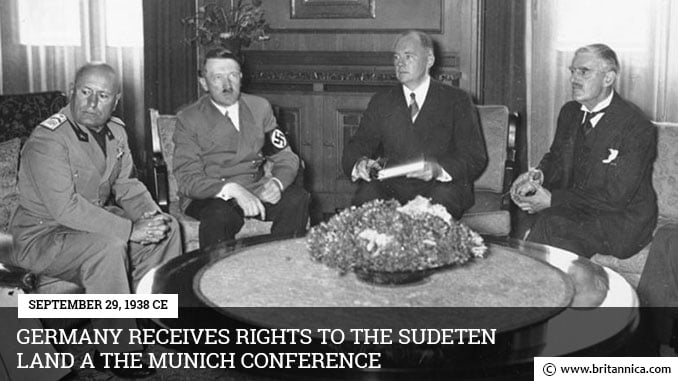Attempting to keep from launching Europe into another war, representatives from France, Great Britain and Italy signed an agreement with officials from Nazi Germany on September 29, 1938 that would lead to conflict anyway. The Munich Agreement, a treaty by which the largely-German parts of Czechoslovakia — the Sudetenland — would become part of the Nazi country, ended up being little more than a speed bump in the advance of Hitler’s armies throughout the continent. The Sudetenland, a large chunk of western Czechoslovakia, held a vast amount of strategic importance. Filled with a significant number of the country’s defense forces, a substantial concentration of banks and vast manufacturing capacity, it is easy to see in hindsight why Adolf Hitler hoped to annex the territory. At the time, however, British Prime Minister Neville Chamberlain and his counterparts in the French and Italian governments looked at the problem as one of displaced people seeking more fair representation. The Germans in Sudetenland had, after all, been lumped into Czechoslovakia only 20 years before at the close of World War I. Blind to Hitler’s larger scheme, Chamberlain advised the Czech President, Edvard Benes, to allow the region to secede from his nation and join their neighbors. Benes opted instead to begin moving his army toward the border in anticipation of a German attack. Hitler, meanwhile, quietly worked with his generals to formulate a plan for the invasion, increasing manufacturing to increase the size of the German war machine at the same time. By early June, “Der Fuhrer” felt comfortable signing off on Operation Green, a top secret order to launch an assault on Czechoslovakia by October 1, 1938. As spring pushed into summer, the British and French sought a means to create an amicable solution, consulting with Czech representatives frequently regarding the Sudetenland. The German press, with the goal of building sentiment against the Czechs, published false stories of mistreatment of their compatriots in the territory in question. Even as Benes attempted to pacify protesting Sudeten Germans, Hitler continued to incite rebellion by encouraging his people to hold out for independence. After Chamberlain met with Hitler to discuss the situation in mid-September, dominoes began to fall into place. The British and French, meeting in London to talk through the developments and formulate a proper course for the negotiations, had plenty of ideas for war against Germany and for the independence of Sudetenland. Firm in the belief it was fair for those lands filled with predominantly German citizens to gain independence, Great Britain and France offered military support to Czechoslovakia in the event of an attack. The Czechs rejected the plan outright. Through two more weeks of negotiations — none of them with Benes or any other representative of the Czech government — Edouard Daladier of France, Benito Mussolini, Chamberlain and Hitler worked out the details of an arrangement to benefit all involved. In the early morning of September 30, 1938, after a marathon session on the 29th, the four men announced the official “Italian plan” for the Sudetenland. Formed in the German Foreign Office and delivered by Mussolini, the Munich Agreement allowed the German army to move forward into the areas in which their countrymen were the majority by October 10th. Once the transfer of power had been accomplished there, a multi-national group would decide the future of other contested territories. The British and French, happy to have averted another war, returned home to tout the worthiness of the agreement. Chamberlain delivered an address from the Heston Aerodrome in which he said, “I have returned from Germany with peace in our time.” Relieved, the government went on oblivious to the problems they had unwittingly created. The Czechs — and ally Josef Stalin of Russia — furious that the French had negotiated behind their backs, immediately began pulling the military together for a new war. For his part, Hitler found dealing with Chamberlain to be a headache far beyond what it was worth. Filled with animosity, he directed his leadership council to avoid international conferences from then on — he had no intention of completing a truce ever again. In March 1939, despite a promise to hold fast until disputed regions could be assigned by the international community, German tanks rumbled into what remained of Czechoslovakia. The policy of appeasement having shown to be folly, the British and French began mobilizing their armies to enter a new conflict. Once Hitler’s forces attacked Poland the following September, World War II officially began. Also On This Day: 480 BCE – Themistocles leads the Greek navy to victory over Xerxes I of Persia at the Battle of Salamis 1364 – The Breton War of Succession ends at the Battle of Auray 1547 – Spanish author Miguel de Cervantes is born 1949 – The Communist Party of China launches the Common Program to guide the future of the nation 1954 – The European Organization for Nuclear Research (CERN) is established
September 29 1938 CE – Germany Receives Rights to the Sudetenland at the Munich Conference
Attempting to keep from launching Europe into another war, representatives from France, Great Britain and Italy signed an agreement with officials from Nazi Germany on September 29, 1938 that would…
597
